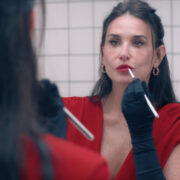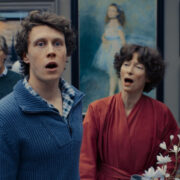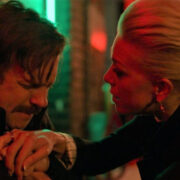NORMAL PEOPLE Season 1: An Intimate & Heart-Aching Depiction Of Young Love
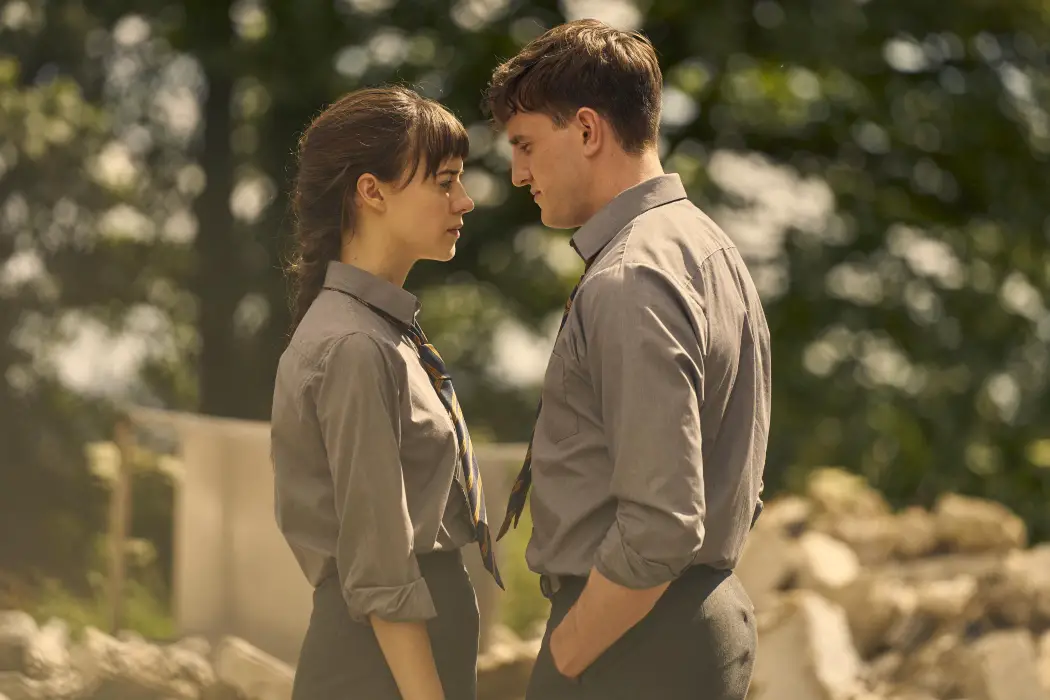
Reyzando Nawara is a passionate film and TV enthusiast from…
We’ve heard this tale before; two teenagers from different backgrounds falling in and out of love while navigating the difficulty of life. Books, movies, and TV shows have all documented this story a countless number of times, telling it from different angles while giving new twists so that it would be less familiar. While some of it works, not all of those can quite capture the magic and feelings found in Sally Rooney‘s 2018 bestselling novel Normal People. The reason isn’t that Rooney manages to put an exciting spin on it, but simply because of how it’s told and treated. Instead of zeroing on the drama, like what has been done before so many times, Rooney chooses to focus on the mundanity of the events that shape the characters and their relationships.
There are no big, life-changing moments. Even when death, fights, and moving to new places become big parts of the story, everything is kept as subtle and emotionally grounded as possible. But this is exactly why so many people can connect to the book on a deeper level. The relationship depicted in the book is so real and universal that reading it from page to page feels like seeing your own relationships unfold. And this is also why the fans of the book, including me, are so worried when they found out that it’s getting adapted into a TV show. Thankfully, the 12-episode limited series, co-produced by BBC and Hulu, is not only able to live up to the source material, but also captures all of the essences perfectly.
The High of First Love
Set in County Sligo and Dublin, Ireland, Normal People focuses on the complicated relationship between Marianne (Daisy Edgar-Jones) and Connell (Paul Mescal), two attractive teenagers who come from two different social classes and have different views of the world. Marianne is the outcast where Connell is the social butterfly and an athlete admired by a lot of his friends. The people in school say that Marianne is ugly even though she’s obviously not. What really alienates her from the rest of the crowd is her bluntness and the fact that she’s the rich girl who lives in the big mansion on the hill. Unlike any of his peers, however, Connell never takes part in making fun of Marianne, even though he’s not defending her either when his friends take it too far.

The two don’t socialize in public. But every day after school, Connell comes to Marianne’s house to pick up his mom Lorraine (Sarah Green) who works as her family cleaning lady. It’s during one of his pick-ups that Connell and Marianne start to get to know each other, and eventually begin hooking up after Marianne confesses to Connell that she likes him. There’s one condition that they both agree on though; they keep whatever it is that they’re doing — yes, they don’t put a label on it — as discreet as possible because Connell’s afraid that if his peers know about it, he will be pushed down at the bottom of the social ladder like Marianne.
For a while, everything works just fine. The two keep finding time to have sex nearly every day— and by the way, like in the original book, they have sex a lot here. Be it in Connell’s bed, or in his car, they just can’t seem to get enough of each other. It’s obvious, however, that it’s not just youthful lust that makes them drawn to one another, but also how they’re able to understand each other in ways that other people don’t. Marianne can talk about her horrible and abusive family to Connell. And for the first time, Connell can be honest about his love of reading books. They don’t need to articulate their feelings because they know how much they mean to each other. But of course, it doesn’t last. Marianne eventually gets hurt when Connell keeps choosing his friends over her. And when he realizes how badly he’s hurt Marianne, everything is too late.
The first two episodes focus on exploring how the pain they give to each other sets their dynamic in years to come as the two of them become on again and off again throughout college. Even though the tables have turned, now Marienne becomes the popular girl while Connell is the wallflower, they always find a way to get back to each other — not always as a couple, sometimes as friends and some other times as foes. Seeing two people drifting apart, hurting each other, and getting back together just to repeat the same things can be a little frustrating. And sometimes it is. But never once does it feel exhausting and repetitive. If anything, it’s through their complicated relationships that the show hammers home its message on how our first real love leaves permanent marks, and affects the way we grow up more than we let on.
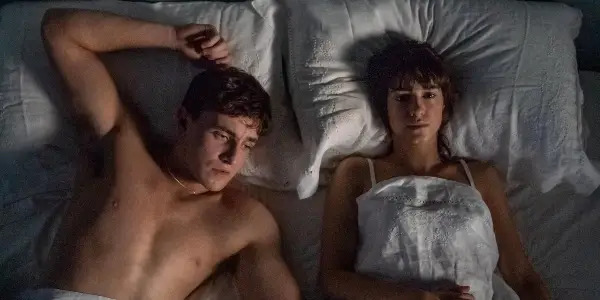
Oftentimes, we’d like to think that to be miserable over our first relationships is just silly, especially when it happens while we’re still as young as Marianne and Connell. But we’d be lying if we say we never think at least once about the ecstasy of our first kiss or the excitement of meeting someone who really understands us for the first time in our life. Normal People really understands all of these, reminding us that it’s okay to still have the desire to chase that high of first love once again. Like Marianne and Connell, we’ve all been there. And that’s why just like the book, watching how these two people find ways to get back to each other will definitely send us down to memory lane.
The show also does a terrific job of translating all the quiet and tender moments of the book beautifully on-screen. And it’s all because of the marvelous direction from the Oscar-nominated Lenny Abrahamson and Hattie Macdonald who always keep every moment intimate. Even in all the steamy sex scenes, the direction never feels exploitative. The performances and chemistry from the two leads are also electric as well. Edgar-Jones is able to display Marianne’s intensity in a phenomenally subtle way. And in his first-ever TV role, Mescal excellently showcases the insecurity and vulnerability that Connell is feeling inside. Whether when they’re apart or together, both of these leads really capture the essence of the book with their displays of emotions.
Growing Up Together
While Marianne and Connell’s relationship remains the crux of the story until the very end, Normal People also never shies away from all the problems that each of these characters are facing individually. For Marianne, her problems are stemmed from all the bullying and abuse that she experiences while in Sligo. The trauma has led her to believe that she’s not worthy of love, and that it’s really hard for her to make other people like her. That’s why she always clings back to Connell at the end of the day. He’s after all the first, and probably the only, person who loves and understands her for who she really is. In an attempt to understand her pain and trauma, Marianne explores BDSM while she’s studying in Sweden. But the show still manages to depict it in the most honest and tender way possible.
Connell, on the other hand, keeps struggling to articulate his feelings and thoughts to a point that it’s not just affecting his relationship with Marrianne, but also his own mental health. In the remarkable tenth episode of the show, Connell’s issue is brought to light when he goes to visit a free counseling service. First to just talk about his struggle of processing the loss and grief he feels over the suicide of his highschool friend Rob (Eanna Hardwicke). But then it’s revealed that ever since he’s moved from home to go study at Trinity College in Dublin, Connell’s been spiraling into depression because of his inability to talk about his problems.

Shot without any cuts in nearly six minutes, Connell talks about the burdens he’s been shouldering for a very long time; how lonely he feels after he moved to Dublin. “I think I thought if I moved here I’d fit in better. I thought I’d be with more like-minded people but that just hasn’t … I left Carricklea thinking I could have a different life,” Connell declares while trying to hold himself together. “But, I hate it here and I can never go back because those friendships are gone and Rob is gone and I can’t see him again. I can’t get that life back.” It’s a heart-crushing scene, and one that’s made even rarer because it is told from the perspective of a male character like Connell.
Connell’s mental health and Marianne’s submissive feelings aren’t the only two subjects that Normal People explores besides the main relationship. Through how often misunderstood and out of place Marianne and Connell are, the show also understands how difficult it is to be human beings who must navigate the complexity of life and relationships while expected to always be and do more even though you know that sometimes you just want to go through your life one day at a time. Also from the two main characters, Normal People makes sure that we know it’s okay if we don’t know what we’ll do in the future, or even tomorrow, because to just step out of our beds in the morning, can already be taxing enough for some of us. What matters is that we try.
A Pitch-Perfect Adaptation
From the top-notch performances by Edgar-Jones and Mescal to the intimate directions from Abrahamson and Macdonald, as well as Rooney, Mark O’Rowe, and Alice Birch’s honest writings, every aspect of Normal People is brilliantly crafted. It truly is a pitch-perfect adaptation. By the time you get to the end of the twelfth episode, you’ll feel grateful that you have spent your time with Marianne and Connell. Oh, and you will also feel overwhelmed, heartbroken, happy, and empty at the same time. It will really mess with your heart.
What do you think of this adaptation? Do you think it lives up to the original source? Let us know in the comments below!
Watch Normal People
Does content like this matter to you?
Become a Member and support film journalism. Unlock access to all of Film Inquiry`s great articles. Join a community of like-minded readers who are passionate about cinema - get access to our private members Network, give back to independent filmmakers, and more.
Reyzando Nawara is a passionate film and TV enthusiast from Indonesia. When he's not watching TV and movies, he likes to cook and make sorbet.


